|
|
|
Sort Order |
|
|
|
Items / Page
|
|
|
|
|
|
|
| Srl | Item |
| 1 |
ID:
119766
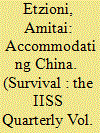

|
|
|
| 2 |
ID:
094493
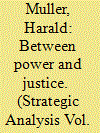

|
|
|
|
|
| Publication |
2010.
|
| Summary/Abstract |
The nuclear non-proliferation regime, despite being frequently criticised for an alleged lack of effectiveness, is in fact an amazing success story. The number of states which had conducted nuclear weapons activities in various stages but which have terminated them at one point surpasses the number of Nuclear-Weapon States (NWSs) by far. At the apex of its success, however, the regime is threatened by erosion from three different directions. A small number of rule-breakers and outsiders undermine its central objective: to stop the spread of nuclear weapons. The refusal of the official NWSs to fulfil their undertaking of nuclear disarmament violates the principle of justice enshrined in the treaty and thereby destroys its legitimacy, as does the perceived readiness by nuclear suppliers to impede the development of nuclear technology in developing countries. The Gordian Knot can presumably only be cut by a u-turn towards a world without nuclear weapons. This insight has meanwhile reached the mainstream security establishment of the United States, the president included. Whether this road will really be taken will determine the future of the regime-with far-reaching consequences for global security.
|
|
|
|
|
|
|
|
|
|
|
|
|
|
|
|
| 3 |
ID:
122600
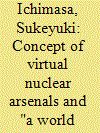

|
|
|
|
|
| Publication |
2012.
|
| Summary/Abstract |
Proposed by J. Schell and others in the Cold War era, the concept of virtual nuclear arsenals has been
a subject of debate. From the standpoint of the theory of nuclear disarmament, the concept has been
questioned on the basis of justifying the nuclear threat, infringing on the irreversibility requirement of
disarmament, and fixating the discriminatory structure of nuclear weapons. On the other hand, from
the viewpoint of the theory of nuclear deterrence, the problem of instability and feasibility inherent in
the concept and the idea of reconstructing nuclear arsenals that will decrease second strike capability
have been under harsh criticisms. Attempting to find new inter-linkages between the debates of
nuclear disarmament and deterrence theories over the vision of "a world without nuclear weapons"
proposed by the US Obama administration, this study sets out to examine the implications that the
concept of virtual nuclear arsenals may have on the current international security environment from
the two aspects of: nuclear deterrence and disarmament; and nuclear non-proliferation.
|
|
|
|
|
|
|
|
|
|
|
|
|
|
|
|
| 4 |
ID:
034135
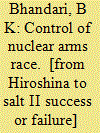

|
|
|
|
|
| Publication |
New Delhi, ABC Publishing House, 1984.
|
| Description |
230p.
|
|
|
|
|
|
|
|
|
|
|
|
Copies: C:1/I:0,R:0,Q:0
Circulation
| Accession# | Call# | Current Location | Status | Policy | Location |
| 024887 | 327.174/BHA 024887 | Main | On Shelf | General | |
|
|
|
|
| 5 |
ID:
094496
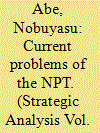

|
|
|
|
|
| Publication |
2010.
|
| Summary/Abstract |
With the 'world without nuclear weapons' speech by President Obama and the other moves, indications are good for the next Nuclear Non-Proliferation Treaty (NPT) Review Conference. Progress has to be made on the Comprehensive Test Ban Treaty (CTBT), the proposed fissile materials cut-off treaty (FMCT), Negative Security Assurance (NSA), and reducing the role of nuclear weapons. On the non-proliferation side, the Additional Protocol must be made a standard, the International Atomic Energy Agency (IAEA) strengthened, and NPT withdrawal acted on decisively. To avoid the threat of nuclear terrorism, a series of measures has to be applied with perseverance. The only realistic way to address the Middle East question is to proceed in parallel on regional peace and the region free of weapons of mass destruction (WMD).
|
|
|
|
|
|
|
|
|
|
|
|
|
|
|
|
| 6 |
ID:
112218
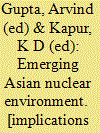

|
|
|
|
|
| Publication |
New Delhi, Lancer's Books, 2012.
|
| Description |
xv, 432p.
|
| Series |
Indian Pugwah Society
|
| Standard Number |
8170951240
|
|
|
|
|
|
|
|
|
|
|
|
Copies: C:2/I:0,R:0,Q:0
Circulation
| Accession# | Call# | Current Location | Status | Policy | Location |
| 056414 | 327.7305/GUP 056414 | Main | On Shelf | General | |
| 056415 | 327.7305/GUP 056415 | Main | On Shelf | General | |
|
|
|
|
| 7 |
ID:
096169
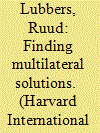

|
|
|
| 8 |
ID:
100416
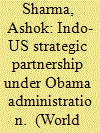

|
|
|
| 9 |
ID:
032935
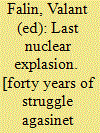

|
|
|
|
|
| Publication |
Moscow, Novosti Press Agency Publishing House, 1986.
|
| Description |
285p.
|
|
|
|
|
|
|
|
|
|
|
|
Copies: C:1/I:0,R:0,Q:0
Circulation
| Accession# | Call# | Current Location | Status | Policy | Location |
| 029782 | 341.73409/FAL 029782 | Main | On Shelf | General | |
|
|
|
|
| 10 |
ID:
100705
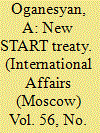

|
|
|
|
|
| Publication |
2010.
|
| Summary/Abstract |
RONALD REAGAN'S SIGNATURE PHRASE "Trust but Verify" surfaced every time the arms reduction talks were discussed in the United States. The "insidious" Russians, meanwhile, opted for "Verify Before Trusting" when dealing with the Americans, the formula suggested by the sad experience of America's unilateral withdrawal from the ABM Treaty and the extreme vagueness of Washington's strategic aims.
|
|
|
|
|
|
|
|
|
|
|
|
|
|
|
|
| 11 |
ID:
030686
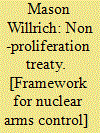

|
|
|
|
|
| Publication |
Calcutta, Scientific Book Agency, 1969.
|
| Description |
xii, 341p
|
|
|
|
|
|
|
|
|
|
|
|
Copies: C:1/I:0,R:0,Q:0
Circulation
| Accession# | Call# | Current Location | Status | Policy | Location |
| 008833 | 327.174/WIL 008833 | Main | On Shelf | General | |
|
|
|
|
| 12 |
ID:
184890
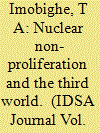

|
|
|
| 13 |
ID:
113186
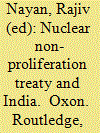

|
|
|
|
|
| Publication |
Oxon, Routledge, 2012.
|
| Description |
viii, 147p.
|
| Standard Number |
9780415593915
|
|
|
|
|
|
|
|
|
|
|
|
Copies: C:1/I:0,R:0,Q:0
Circulation
| Accession# | Call# | Current Location | Status | Policy | Location |
| 056643 | 355.54/NAY 056643 | Main | On Shelf | General | |
|
|
|
|
| 14 |
ID:
128203
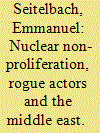

|
|
|
|
|
| Publication |
2013.
|
| Summary/Abstract |
Economic sanctions and the threat of a strike on its nuclear installations, along with an offer of normalization, may force Iran to renounce its nuclear ambitions.
|
|
|
|
|
|
|
|
|
|
|
|
|
|
|
|
| 15 |
ID:
087916
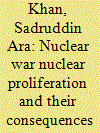

|
|
|
|
|
| Publication |
Oxford, Clarendon Press, 1985.
|
| Description |
viii, 334p.
|
|
|
|
|
|
|
|
|
|
|
|
Copies: C:1/I:0,R:0,Q:0
Circulation
| Accession# | Call# | Current Location | Status | Policy | Location |
| 026098 | 341.734/KHA 026098 | Main | On Shelf | General | |
|
|
|
|
| 16 |
ID:
191946
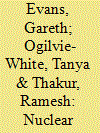

|
|
|
|
|
| Publication |
Canberra, CNND, 2015.
|
| Description |
xxv, 305p.pbk
|
| Standard Number |
9780987487919
|
|
|
|
|
|
|
|
|
|
|
|
Copies: C:1/I:0,R:0,Q:0
Circulation
| Accession# | Call# | Current Location | Status | Policy | Location |
| 060436 | 327.1747/EVA 060436 | Main | On Shelf | General | |
|
|
|
|
| 17 |
ID:
042963
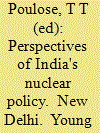

|
|
|
|
|
| Publication |
New Delhi, Young Asia Publications, 1978.
|
| Description |
ii, 252p.
|
|
|
|
|
|
|
|
|
|
|
|
Copies: C:1/I:0,R:0,Q:0
Circulation
| Accession# | Call# | Current Location | Status | Policy | Location |
| 017540 | 341.734/POU 017540 | Main | On Shelf | General | |
|
|
|
|
| 18 |
ID:
033727
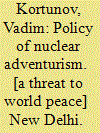

|
|
|
|
|
| Publication |
New Delhi, Sterling Publishers, 1985.
|
| Description |
96p.
|
|
|
|
|
|
|
|
|
|
|
|
Copies: C:1/I:0,R:0,Q:0
Circulation
| Accession# | Call# | Current Location | Status | Policy | Location |
| 029176 | 355.0217/KOR 029176 | Main | On Shelf | General | |
|
|
|
|
| 19 |
ID:
100544
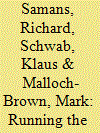

|
|
|
| 20 |
ID:
108881
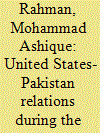

|
|
|
|
|
| Publication |
2011.
|
| Summary/Abstract |
United States-Pakistan relations and devising appropriate policy responses surfaced as one of the most critical foreign policy challenges for the United States since late 2007. The heightened US concern followed the simmering growth of suicide terrorism and extremism in Pakistan as well as the unprecedented increase in al Qaeda and the Taliban attack on the US allied forces in Afghanistan staged from the "safe haven" of Afghanistan-Pakistan border areas. Scholars, analysts and the policymakers started to venture what is wrong with US-Pakistan relations. After the tragic event of 11 September 2001, the United States renewed its relationship with Pakistan, and declared it as an "indispensable ally" against the "global war on terror". It has also been incorporated as a "frontline state" in fighting the US-led war against terrorism in Afghanistan. Ironically, this post-11 September deep alliance between the US and Pakistan also coincided with the latest round of military dictatorship of General Pervez Musharraf in Pakistan. Therefore, a comprehensive analysis of US-Pakistan relations during the Musharraf regime might help us in explaining the problems that their bilateral relations are currently facing and may shed light in formulating future policies for Pakistan afresh. The present paper therefore, focuses on three aspects of the US-Pakistan relations during the Musharraf regime. First, it intends to assess United States' policy objectives during the Musharraf era. Obviously, fighting and eradicating terrorism and extremism was a dominant objective, but there were other objectives as well viz., Pakistan's and global security, nuclear non-proliferation, US's economic and strategic opportunities in South Asia, and democracy promotion in the Muslim world. Second, an attempt is made to analyse the strategies that were followed to pursue the objectives? Economic and security assistances are well-known strategies, but, was implicit support to Musharraf's military regime also a part of US strategy? If yes, what explains such strategy especially since it is contradictory to US's grand strategy of democracy promotion? And finally, what results were achieved by pursuing those policies in such particular way? Therefore, the paper would seek answers to such questions: Were the policies pursued by the US appropriate? Were the ways in which they were pursued the most effective way? Is the present situation in Pakistan an outcome of wrong policies or the wrong strategies? And what explains the lack of US' success?
|
|
|
|
|
|
|
|
|
|
|
|
|
|
|
|
|
|
|
|
|